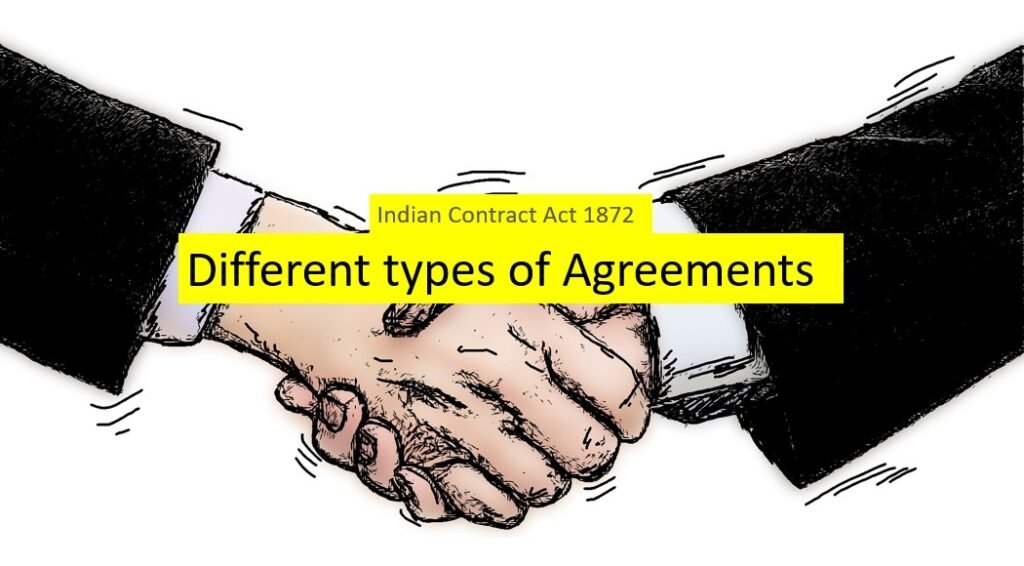An agreement is a promise or arrangement between two or more parties to do, or not do, something.

Different types of agreements
- Valid agreement : An agreement that, if it were to be legally enforced, would transform into a contract and bind the parties to its terms is said to be legitimate. Section 2(e) of the Indian Contract Act of 1872 defines an agreement (the Act). Every promise and every collection of promises that serve as reciprocal consideration constitute an agreement, according to this statement. As a result, a legitimate agreement turns into a contract rather frequently. The following are the prerequisites for a legal agreement: • The agreement must include a legitimate consideration. • According to Sections 11 and 12 of the Act, the parties must be competent to enter into a contract. • The parties’ consent is unrestricted and uninfluenced. • The agreement’s goal is legitimate.
- Void agreement : A void agreement has been defined under Section 2(g) of the Indian Contract Act 1872,It states that “An agreement not enforceable by law is considered to be invalid / Void.” A formal contract that is effectively invalid and unenforceable from the moment it is established is known as a void contract. A void contract is different from a voidable contract because voidable contracts have the potential to become legally enforceable if underlying contractual flaws are fixed, but void contracts were never legally legitimate to begin with and will never be enforced in the future. Contracts that are invalid and contracts that are voidable can both be annulled for related grounds.
- Voidable agreement : An agreement that can be terminated by any party for a variety of legal grounds is referred to as being voidable. When a law makes such a deal enforceable, it will be referred to as a contract that any side may choose to nullify. According to Section 19 of the Act, a party has the right to terminate the agreement as and when it sees proper if its consent was obtained by fraud, misrepresentation, or coercion. Similar to this, under Section 19A, a party that consented to a contract under duress has the right to cancel the agreement and the right to have the deal totally annulled. According to Section 53 of the Act, “when a contract contains] reciprocal promises, and one party thereto prevents the other from performing his promise, the contract becomes voidable at the option of the party so prevented; and he is entitled to compensation from the other party for any loss which he may sustain in consequence of the non-performance of the contract.” In addition to the aforementioned scenarios, the agreement may be voidable at the promisee’s discretion if the promisor fails to fulfil his obligation under the terms of the agreement, whereby time is a necessary prerequisite.
- Illegal / Unlawful agreements : Any agreements that violate the terms of the applicable Indian law are deemed to be unlawful. The agreement shall be void if any of the two circumstances—illegal object or unlawful consideration—occurs. Even if an agreement’s provisions force the parties to commit a crime, they are nonetheless unlawful.
The distinction between unlawful and invalid agreements is that the former are clearly against the law’s provisions, but the latter are not necessarily against the laws now in effect. To put it another way, every void agreement is also unlawful, but not all void agreements are.




0 Comments